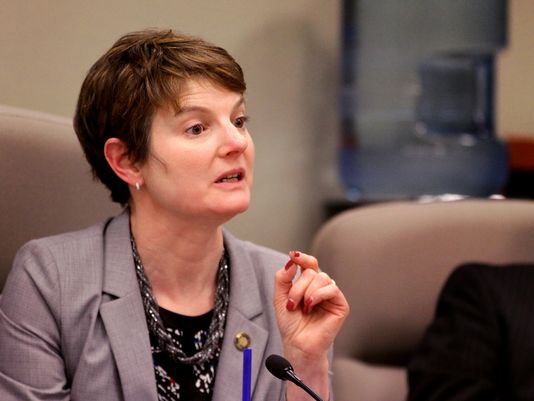Statesman Journal
04/10/2015
By Saerom Yoo
After a controversial bill designed to take away parents’ option to claim nonmedical exemptions from school shots fizzled, its sponsor has come back with a bill that tries to find a middle ground between Oregon’s relatively lax school immunization law and the stricter boundaries that were originally envisioned.
This time, the bill, Senate Bill 895, is being considered in the Senate education committee.
A public hearing Thursday was packed with familiar faces who vehemently opposed Senate Bill 442 earlier this session. They accused Sen. Elizabeth Steiner Hayward, D-Beaverton, of simply repackaging SB 442, giving it a new name and slipping it into the education committee.
Unlike SB 442, SB 895 would preserve parents’ ability to opt out of school-required shots for personal-belief reasons, but it calls on schools to notify parents of their nonmedical exemption rates on report cards.
It also would, with an amendment, eliminate online video modules produced by the Oregon Health Authority as an option to fulfill the law’s education requirement before claiming a nonmedical exemption. If the bill passes with the amendment, the education requirement could be fulfilled only through the signature of a physician (including naturopathic physicians), physician’s assistant or a nurse practitioner vouching that the parent had received consultation on the risks and benefits of immunizations.
In addition, children who are on an approved vaccine catch-up schedule would not have to claim an exemption.
Oregon has the nation’s highest vaccine opt-out rate for kindergartners, at 7 percent. It’s a figure that has been rising steadily over 15 years. Some schools have exemption rates as high as 16 percent, said Aaron Dunn, who testified on behalf of OHA.
That exemption level is concerning, experts say, because it threatens the community’s ability to stave off disease outbreaks.
Steiner Hayward, a family physician and sole sponsor of SB 895, told the education committee that making immunization rates of schools readily available to parents allow them to make informed decisions if at home they have an infant who is too young to be fully immunized, a child who has a compromised immune system, or an elderly person who needs extra protection from preventable diseases.
She added that videos are not adequate to achieve true informed consent for parents.
Critics of the bill claimed that the school exemption rate statistics would be used to shame families and breach confidentiality. Steiner Hayward responded by saying that the numbers would be aggregate only. The statistics are already public through the OHA.
“This is not about shaming but about community conversations and parental awareness,” she said.
Among supporters of the bill were the Oregon Academy of Family Physicians, Oregon Medical Association, Oregon Nurses Association and Coalition for a Healthy Oregon.
Sen. Jeff Kruse, R-Roseburg, challenged proponents of the bill, asking why a vaccine against hepatitis B was necessary for newborns and whether Oregon had outbreaks caused by underimmunization.
He also said Oregon should not be basing its policy on the recommendations of the Centers for Disease Control and Prevention.
“The CDC, in my opinion, on many levels is somewhat of an inept organization and maybe somewhat corrupt,” he said.
One mother, Holly Garland, said she did not want anyone to take away her or her children’s individual rights.
Sen. Mark Hass, D-Beaverton, responded with a question of his own.
“What about my rights to send a first-grader to school in an environment where I know he is safe and not going to contract measles, diphtheria, mumps, pertussis and small pox?” Hass said. “I have rights, too. Parents have rights, too. We don’t give people rights to go 150 miles an hour on the freeway for the common good of others.”
Attorney Robert Snee said the bill was designed to make opting out of vaccines more difficult, rather than help educate parents. J.B. Handley said the bill was effectively a vaccine mandate if health care providers refuse to sign the exemption paperwork for parents.
The committee ran out of time before everyone who signed up to testify had a chance to speak. Sen. Arnie Roblan, D-Coos Bay, committee chairman, said another hearing would be scheduled.
syoo@StatesmanJournal.com, (503) 399-6673 or follow at Twitter.com/syoo.

